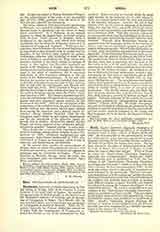

Knoblecher, IGNATIUS, Catholic missionary in Central Africa, b. July 6, 1819, at St. Cantian in Lower Carniola; d. April 13, 1858, at Naples. He studied at the gymnasium of Rudolfswerth, at the lyceum and the theological seminary of Laibach, and at the college of Propaganda in Rome. On March 9, 1845, he was ordained priest, and a year later was graduated at Propaganda as doctor of theology. When the Vicariate Apostolic for Central Africa was erected on April 3, 1846, the Congregation of Propaganda selected Knoblecher as one of the missionaries for that country. Before leaving for Central Africa he spent eight months on the Lebanon and at other places in Syria to acquaint himself with the rites and customs of the Oriental Christians. Towards the end of September, 1847, he left Cairo in company of Maximilian Ryllo, S.J., the Pro-Vicar Apostolic of Central Africa, and four other missionaries, and arrived at Khartoum on February 11, 1848. Here they erected a school for young negroes whom they had purchased in the slave-market and who subsequently assisted them on their missions. Through them Knoblecher became acquainted with the languages spoken in the interior of Africa, and was soon enabled to compile a sort of dictionary of these languages. When Father Ryllo died, on June 17, 1845, Knoblecher succeeded him as pro-vicar Apostolic. From Khartoum Knoblecher made an expedition into the interior of Africa in the fall of 1849. He ascended the Bahr-el-Abiad (White Nile) and was the first white man to penetrate into the land of the Bari tribe as far as 4° 10′ north latitude. In 1850 he went back to Austria to recruit missionaries and collect money for the African missions. He returned to Africa in 1852 with five new missionaries, erected a mission among the Bari tribe at Gondokoro, and in 1854 another among the Denka or Jangeh tribe at Angweyn (Heiligenkreuz). The missionaries were hampered in their apostolic labors by European merchants and slave-traders, to whose interest it was to keep the tribes of Central Africa in a state of savagery and heathenism. The deadly climate also cut short the lives of many missionaries, and Knoblecher himself died while making a journey to Europe to regain his health. Valuable accounts of his travels in Central Africa were published in “Jahresberichte des Marienvereins” (Vienna, 1852-58). His large ethnographical and ornithological collections are preserved in the cabinets of natural curiosities at Vienna and Laibach, and the studies which he prepared on the Denka and Bari languages are to be seen in the Imperial Library of Vienna.
MICHAEL OTT

